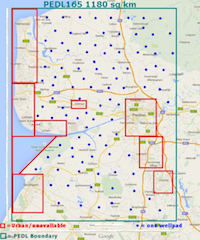Endangered Species Watch
We have been made aware of the existence on an example of a rare and endangered species, which was spotted just this week in London and which may get in the way of fracking in the UK.
Coeruleus illegitimus senex (Common name Peter Lilley) was spotted in the House of Commons last week. He is easily distinguished by his characteristic call, a shrill and repeated “shale good, wind bad, share options better”
The unreconstructed old style Tory minister seems to think that regulations are just there to get in the way of his and his friends’ pet project and is agitating to get regulation circumvented to allow shale gas extraction to proceed apace.
Here’s what he had to say last week
http://www.theyworkforyou.com/debates/?id=2013-07-11a.530.1
Peter Lilley (Hitchin and Harpenden, Conservative)
Given that 2 million fracking wells have been drilled in the United States without harm to life or property, will my right hon. Friend act vigorously to thwart the vexatious use of environmental laws by Friends of the Earth and others to keep shale gas in the ground? In particular, will he introduce early legislation to clarify UK red-line planning laws and to restrict them to surface installations? Will he also tell us what he plans to do to prevent the mining waste directive and the groundwater directives from being used expansively to delay and prevent the exploitation of shale gas in this country?
Leaving aside the fact that the idea that “2 million fracking wells have been drilled in the United States without harm to life or property” is laughable, why would any responsible government recklessly ignore regulations designed to protect people. Even more bizarre, why should such an exception only be made for shale gas. He is obviously very concerned that shale gas operators might have to be accountable for the water they leave underground – something which appears totally reasonable to us, and he is evidently trying to restrict redlining (in which applicants have to clearly identify the geographical scope of their applications) so that the underground area (under our houses) doesn’t have to be considered. If he were successful in this totally undemocratic, suggestion then the need for landowners to give permission for their land to be drilled under and fracked would potentially disappear. He is keen to do this as this right is potentially a major stumbling block for his fracking friends. He must not be allowed to get away with it.
What he doesn’t perhaps realise as well, is that by creating special exemptions for shale gas, rather like the US EPA’s exemption of shale gas drillers from the provisions of Safe Drinking Water Act in the Energy Policy Act of 2005, he risks creating a backlash from otherwise complacent people who will wake up to the trick that is being played on them.
The minister’s response to this obviously planted question is a fine example of Fallonian wibble and exaggeration.
Michael Fallon (Sevenoaks, Conservative)
The Environment Agency has already announced its actions to streamline and simplify the system of permits required, which will be in the interest of everyone, including developers and local communities. My colleagues in the Department for Communities and Local Government will next week announce a simplified system of planning guidance so that the industry can be clear about the necessary planning permissions. As I have said, the Treasury will also announce next week the fiscal incentives that are necessary if we are to see this industry develop on anything like the scale that we have seen on the other side of the Atlantic.
Does he REALLY think they can develop a shale gas industry “on anything like the scale that we have seen on the other side of the Atlantic”? If so God help us all.
More planted questions from pro shale Conservative MPs followed. If you need an emetic read this one
Christopher Pincher (Tamworth, Conservative)
Further to the question from my right hon. Friend Mr Lilley, what action can the Government take to help to bust the myths about shale gas and hydraulic fracturing, so that local authorities—which are often a stumbling block—will be more inclined to grant planning applications? In that way, the Treasury, communities and energy users will be able to benefit from this vital national resource.
Michael Fallon (Sevenoaks, Conservative)
I am grateful to my hon. Friend. We all have a responsibility to ensure that the debate over shale and fracking is conducted on the basis of evidence rather than myths. I want to ensure that the developers of potential shale resources and those who want to dig exploration wells engage early with local communities. I also want to ensure that those communities that want to host shale are fully aware of the procedures involved and of the significant financial benefits that could accrue.
I suppose we can all have a hollow laugh about the communities “that want to host shale”. Can he give us an example of one I wonder?




























